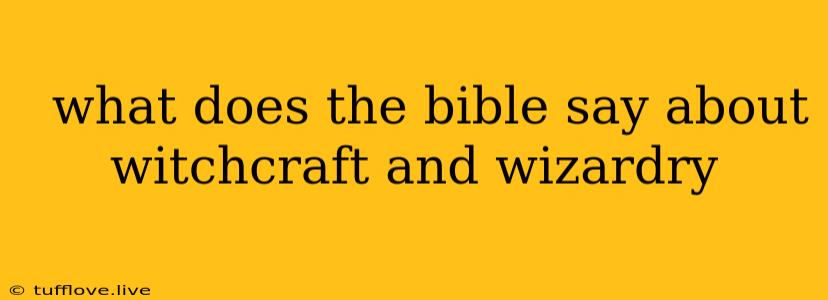The Bible, as a collection of sacred texts for Christians, offers a complex and multifaceted perspective on witchcraft and wizardry. While it condemns practices that involve invoking demonic powers or manipulating the supernatural realm for personal gain, it also acknowledges the existence of spiritual forces beyond human understanding. Understanding the biblical perspective requires navigating diverse passages, recognizing cultural contexts, and recognizing the distinction between genuine spiritual power and harmful, manipulative practices.
Biblical Condemnation of Witchcraft and Wizardry
The Old Testament, particularly the books of Exodus, Leviticus, and Deuteronomy, condemns various forms of divination and sorcery, including witchcraft. These texts highlight the dangers of engaging with practices that seek to access or manipulate the supernatural realm outside of God's will.
Exodus 22:18 states, "Thou shalt not suffer a witch to live." This verse, often cited as a condemnation of witchcraft, emphasizes the seriousness of the practice in the eyes of God. However, it's crucial to understand the context of this verse. In the ancient world, "witchcraft" often encompassed a broad range of practices, including healing rituals, divination, and even simple herbal remedies. This makes it difficult to draw a direct correlation with modern notions of witchcraft.
Leviticus 19:26 warns against "necromancy," the practice of communicating with the dead. This verse reflects the biblical understanding that communication with the dead is forbidden and dangerous.
Deuteronomy 18:10-12 states, "There shall not be found among you any one that maketh his son or his daughter to pass through the fire, or that useth divination, or an observer of times, or an enchanter, or a witch, or a charmer, or a consulter with familiar spirits, or a necromancer, or one that asketh counsel of the dead. For all that do these things are an abomination unto the Lord." This passage condemns a wide range of practices associated with the occult, emphasizing their abhorrent nature in God's eyes.
The Influence of Demonic Forces
The Bible also acknowledges the existence of demonic forces that can influence human behavior and even possess individuals. These forces are portrayed as being opposed to God and seeking to harm humans.
1 Samuel 28:3-25 narrates the story of King Saul consulting the witch of Endor to seek guidance from the spirit of the prophet Samuel. This passage demonstrates that even those who are not overtly practicing witchcraft can be susceptible to demonic influence.
Ephesians 6:12 states, "For we wrestle not against flesh and blood, but against principalities, against powers, against the rulers of the darkness of this world, against spiritual wickedness in high places." This verse emphasizes the spiritual nature of the battle against evil and the need for spiritual armor and protection.
Distinguishing Between True Spirituality and False Occultism
The Bible emphasizes the importance of seeking guidance and power from God alone. While it condemns practices that seek to manipulate the supernatural realm for selfish purposes, it also affirms the reality of spiritual gifts and the power of God.
1 Corinthians 12:7-10 describes various spiritual gifts, including prophecy, healing, and speaking in tongues. These gifts are bestowed by the Holy Spirit and are used for the benefit of the church and the glory of God.
James 1:17 states, "Every good gift and every perfect gift is from above, and cometh down from the Father of lights, with whom is no variableness, neither shadow of turning." This verse affirms that true spiritual power originates from God and is characterized by love, wisdom, and righteousness.
Interpreting Biblical Teachings on Witchcraft and Wizardry
It's essential to acknowledge that biblical passages on witchcraft and wizardry need to be interpreted in light of their historical context and cultural background. The condemnation of specific practices doesn't necessarily translate directly into condemnation of every modern interpretation of witchcraft.
Moreover, it's crucial to avoid judgment and prejudice against individuals who may identify as witches or wizards. The Bible emphasizes love and compassion towards all people, regardless of their beliefs or practices.
Conclusion
While the Bible clearly condemns practices that seek to manipulate the supernatural realm for personal gain or invoke demonic forces, it also acknowledges the existence of spiritual forces and encourages seeking guidance and power from God alone. Understanding the biblical perspective on witchcraft and wizardry requires careful analysis of historical context, cultural nuances, and the distinction between genuine spiritual power and harmful, manipulative practices. Ultimately, the focus should be on seeking God's will and living a life of love, righteousness, and compassion.
